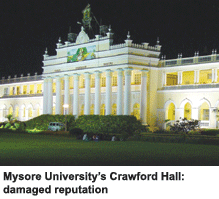 Rampant, unchecked political interference and corruption, which has resulted in the steady decline of Karnataka’s once-prestigious Bangalore University (estb.1964) over the past three decades, is all set to take down this southern state’s vintage Mysore University (MU, estb.1916), which has 122 affiliated colleges and five constituent colleges with an aggregate enrolment of 53,000 students statewide, as well. Over the past month, the 739-acre campus of the university sited in the heart of history-rich Mysore (pop.800,000), has witnessed violent student protests and bandhs, and an ugly spat between the vice chancellor V.G. Talwar and Karnataka’s governor H.R. Bharadwaj, ex officio chancellor of the state’s 11 universities.
Rampant, unchecked political interference and corruption, which has resulted in the steady decline of Karnataka’s once-prestigious Bangalore University (estb.1964) over the past three decades, is all set to take down this southern state’s vintage Mysore University (MU, estb.1916), which has 122 affiliated colleges and five constituent colleges with an aggregate enrolment of 53,000 students statewide, as well. Over the past month, the 739-acre campus of the university sited in the heart of history-rich Mysore (pop.800,000), has witnessed violent student protests and bandhs, and an ugly spat between the vice chancellor V.G. Talwar and Karnataka’s governor H.R. Bharadwaj, ex officio chancellor of the state’s 11 universities.
On August 17, Akhil Bharatiya Vidyarthi Parishad (ABVP) and Vishwavidyanilaya Ulisi Horata Samiti (VUHS) students’ union activists laid siege to the university’s Manasagangotri campus demanding Bharadwaj initiate action against former MU vice chancellor J. Shashidhara Prasad for violating norms in the recruitment of teaching and non-teaching staff during his five-year tenure (2003-2007). The students called on Bharadwaj to act on the recommendations of the Justice H. Rangavittalachar Commission, appointed by the Karnataka state govern-ment in early 2009 to probe the allegations against Prasad. The Rangavittalachar Commission, in its report submitted to the government in September last year had indicted Prasad for violating the state government’s caste-based faculty reservation regulations, and appointing non-meritorious candidates to teaching positions in violation of the norms laid down by the Delhi-based University Grants Commission, and recommended criminal action against the former vice chancellor.
As per the commission’s recommen-dations, on June 14 the state government’s higher education department directed incumbent vice chancellor Talwar to initiate “criminal proceedings” against Prasad. However Bharadwaj, a former Union law minister, in his capacity as chancellor of MU issued a “communication” to the state government and Talwar not to initiate legal action against Prasad, contending it would be “illegal”. This prompted a volte face by the higher education department which issued another government order dated July 14, rescinding its June 14 order, and instead asked Talwar to take “necessary remedial action to correct the procedural irregularities in consultation with the government”.
This back and forth on the issue of prosecuting Prasad (whose father Javare Gowda was vice chancellor of MU during 1969-1975) who reportedly inducted 165 incompetents into the university’s faculty and muster rolls, has angered students of this 95-year-old university, who through the month of August staged protests and dharnas, bringing all teaching activity to a grinding halt. With student protests on the MU campus snowballing, on August 17 Talwar pacified the agitators by agreeing to place the matter before the MU syndicate.
While Talwar’s assurances managed to temporarily mollify the students, his conciliatory action was interpreted by Bharadwaj as “insubor-dination”. On August 22, on a visit to Mysore, Bharadwaj lashed out at the beleaguered vice chancellor accusing him of inciting students to protest against him. “I will never come to the University of Mysore again. You are setting the students against me. You are insulting me,” Bharadwaj told Talwar.
The outcome of this constant political interference by politicians and the governor, who has read too much into his ceremonial role as chancellor of the state’s universities, is that academic standards and infrastructure of this once reputed university are steadily deteriorating. Established in 1916 by the then Maharaja of Mysore, His Highness Sri Krishnaraja Wodeyar IV and his dewan, the renowned engineer-statesman Sir M.Visvesvaraya, MU is the oldest university in the state and fifth oldest countrywide, with its 35 postgra-duate departments dispensing over 55 academic programmes to 3,500 students. Over the past decade, caste-based facu-lty appointments, admission and exam-related scandals and constant interfe-rence in institutional management by the state’s rustic politicians have severely damaged the varsity’s reputation.
“It’s tragic to witness how academic standards and infrastructure at this once premier university are going from bad to worse. To restore Mysore University to its former glory and reputation, the government must restore its adminis-trative and academic autonomy and faculty appointments must be made fully transparent, merit-based and perform-ance linked,” says Dr. A.S. Seetharamu, an alumnus and former faculty member of Mysore University, and former professor of education at the Institute of Social and Economic Change, Bangalore.
This prescription is hardly new and is applicable to all of India’s 509 univer-sities and 31,000 colleges. Students and the academic community need to join forces to wrest autonomy from the country’s levelling-down politicians and bureaucrats. It will never be ceded voluntarily.
Summiya Yasmeen (Bangalore)